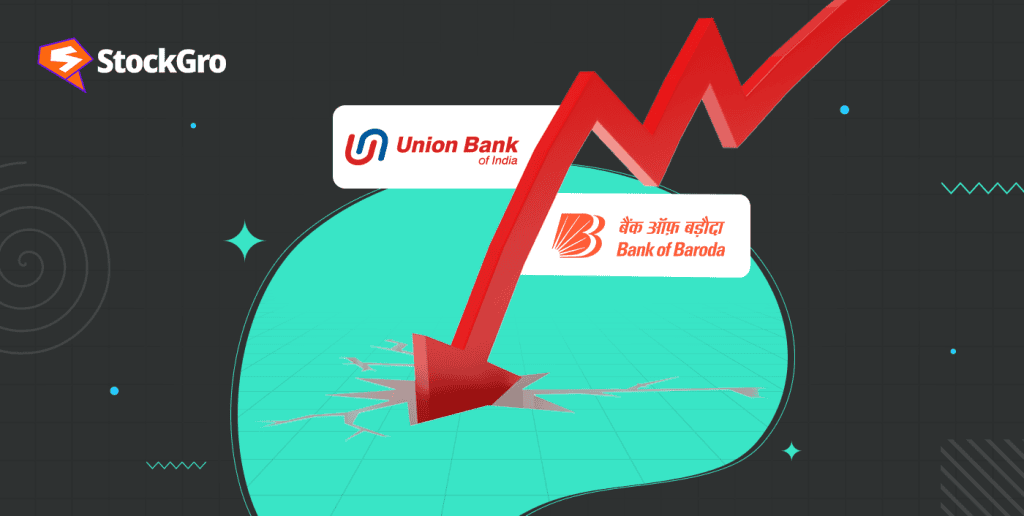
The public sector banking sector hit a rough patch as weak Q3 updates sent stocks tumbling. Union Bank, Bank of Baroda (BoB), and other key players saw declines of up to 7%, dragging the Nifty PSU Bank index down by over 3% on January 6, 2025.
Why are PSU bank stocks falling?
The sharp decline in PSU bank stocks follows lackluster Q3 performance reports that fell short of market expectations. The Nifty PSU Bank index, which had been on a four-day winning streak, reversed course and emerged as the top sectoral laggard.
Also read: PSU banks in India: History, major stocks and outlook
Key losers:
- Union Bank of India (UBI) led the fall, dropping 7% to ₹ 115.14. UBI reported a 3.8% year-on-year (YoY) rise in deposits but saw a 2% sequential decline compared to the September quarter. Advances rose 5.9% YoY to ₹ 9.49 lakh crore.
- Bank of Baroda slid 4.9% to ₹ 229.74. The bank reported 11.7% YoY growth in global business, with deposits up 11.82% YoY to ₹ 13.92 lakh crore.
- Punjab National Bank (PNB) also saw its shares fall by 4.2% to ₹ 101.95 despite reporting 14.4% YoY growth in domestic deposits.
What is driving this trend?
While PSU banks have shown resilience in the past year, concerns over slowing growth and declining asset quality have begun to surface.
Also read: A strong FMCG growth projection for 2025 results 17% surge in stocks
Union Bank Q3 Snapshot:
| Metric | Q3 FY25 Value | YoY Growth | QoQ Growth |
| Deposits | ₹ 9.49 lakh crore | 3.80% | -2% |
| Advances | ₹ 9.49 lakh crore | 5.90% | 2.20% |
| Global Business | ₹ 21.65 lakh crore | 4.70% | -0.24% |
Bank of Baroda Q3 Snapshot:
| Metric | Q3 FY25 Value | YoY Growth | QoQ Growth |
| Global Business | ₹ 25.6 lakh crore | 11.70% | – |
| Global Deposits | ₹ 13.92 lakh crore | 11.82% | – |
| Domestic Deposits | ₹ 11.66 lakh crore | 9.23% | – |
The weak sequential growth highlights concerns around slowing momentum, even as YoY figures show positive signs.
You may also like: Avenue Supermarts Share Price Surges 10%, Reaches Upper Circuit
What triggered the sell-off?
Despite solid Q2 results, PSU banks are now under pressure. Analysts suggest that investors are recalibrating their expectations due to several factors:
- Lower-than-expected deposit growth in Q3
- Sequential decline in global business for key players
- Increased selling pressure following subdued outlooks for the sector
Kotak Institutional Equities (KIE) noted that while asset quality has improved, credit costs remain a concern, with net NPA ratios converging to around 1%.
PSU Bank rally: A brief history
PSU bank stocks had been rallying, driven by better asset quality and improving return on equity (RoE). The rally saw stocks like UBI and BOI hit their 52-week highs in December 2024.
| Bank | 52-Week High (Dec 2024) | % Rise in 4 Days |
| Union Bank of India (UBI) | ₹ 132.50 | 7% |
| Bank of India (BOI) | ₹ 129.90 | 8% |
| Punjab National Bank (PNB) | ₹ 108.45 | 6.50% |
Analyst commentary: What experts are saying
Kotak Institutional Equities believes that the PSU bank rally has largely played out. As valuations for tier-2 PSU banks align with SBI, further upside may be limited. However, ongoing government support and capital expenditure plans could still provide long-term growth catalysts.
Also read: Indian QIPs Hit a New Record in 2024: Key Drivers and Insights for the Future
Jignesh Shial from InCred Capital said, “While private banks and NBFCs are outperforming, the slowdown in PSU bank growth was anticipated. The RBI’s focus on resolving deposit growth concerns suggests stronger performance in FY26.”
Should you buy the dip?
While the recent slump might present a buying opportunity for long-term investors, it’s essential to weigh the risks.
Also read: Trent vs. Avenue Supermarts: Who leads the retail race?
Why consider PSU bank stocks?
- Government Support – Strong backing for PSU banks, especially during economic uncertainties.
- Improved Asset Quality – Lower NPAs and improving RoE.
- Growth Potential – As government spending rises, lending demand from corporates may increase.
Risks to watch out for:
- Volatility – PSU bank stocks are prone to significant price swings.
- Slower Growth – Sequential declines in deposits and advances could indicate slowing momentum.
- Valuation Concerns – With valuations catching up to private peers, further upside may be limited.
Bottomline
PSU bank stocks are facing short-term headwinds following weak Q3 updates. While long-term prospects remain intact, investors should brace for volatility. As Union Bank and Bank of Baroda hit speed bumps, the sector’s performance in the coming quarters will hinge on growth in deposits, credit expansion, and ongoing government policies.

